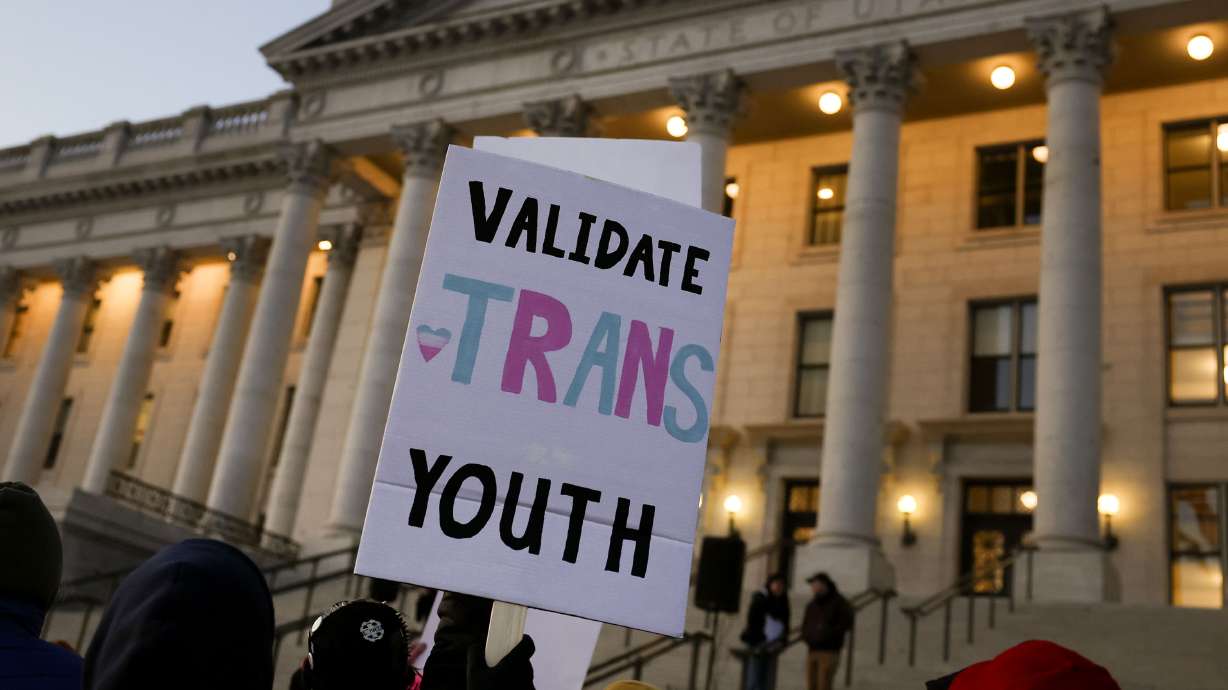
SALT LAKE CITY — A Utah Senate committee advanced a bill Monday limiting restroom access for some transgender people despite concerns that it could risk millions in federal funding for domestic violence shelters and rape recovery centers.
HB257 prevents transgender people from using gender-specific bathrooms or locker rooms that don’t align with their sex at birth unless they have undergone gender-related surgery and legally changed the sex on their birth certificate. It also narrowly defines both “male” and “female” in state code to exclude transgender people.
The bill applies to all taxpayer-funded buildings, including schools, prisons, city and county buildings, and temporary shelters for survivors of domestic violence or sexual assault.
Many of those shelters in Utah receive a majority of their funding through federal grants, which often stipulate that providers follow civil rights laws prohibiting them from discriminating based on sexual orientation or gender identity.
Rep. Kera Birkeland, R-Morgan, has described her bill as an effort to increase privacy in restrooms and has said she has tried to take a “middle-ground” approach to one of the most contentious social issues nationally. She included a provision in the bill that would require increased unisex or single-stall facilities in government buildings, although there is no specific timeline outlining when buildings must convert to provide the accommodations.
“It is very difficult, as a woman, to constantly be told that my feelings, my daughter’s feelings … that their feelings don’t matter as much because it hurts somebody else’s feelings,” Birkeland said.
More than 40 people showed up online and in the crowded committee room to comment on the bill, the majority of whom spoke in opposition. Several transgender individuals spoke of feeling targeted by the series of transgender-related bills lawmakers have passed in recent years.
Opponents also argued that the bill does little to meaningfully protect women and girls in private spaces while singling out transgender people.
“It seems like more of a creepy men in bathrooms issue,” said Sen. Nate Blouin, D-Salt Lake City. “But the way I look at this, it’s really criminalizing someone’s identity and targeting a person more specifically than actually the problematic behavior.”
Marina Lowe, policy director for the LGBTQ rights group Equality Utah, said the bill will “translate into a cloud of fear that hangs over the heads of transgender Utahns — and, frankly, any Utahn whose gender may not be as physically clear — every time they use a public restroom or locker room or other privacy space.”
Darby McNutt, a transgender woman who spoke against the bill, said it “effectively and unjustifiably labels folks like me as potential predators, placing a giant target on our backs.”
Birkeland has said her bill isn’t about “targeting” transgender individuals, and she believes the bill would have little effect because many people already use unisex restrooms. She also believes few transgender individuals wouldn’t be called out for using their preferred restroom, as long as they don’t act inappropriately.
“Nobody I know cares if a transgender woman comes into their bathroom, uses it for its intended purpose, walks out,” she said. “That is not what this bill is about.”
But several individuals expressed concern that the bill would have a chilling effect on access, nonetheless. Others fear that the bill will actually create more concerning situations for women if transgender men with beards or other traditionally masculine features are allowed use the women’s restroom, but not the men’s.
“I wonder if this bill makes it so that a male-presenting person would then need to go into a women’s restroom, and wouldn’t that alarm a reasonable person much more than a transgender woman with biological male parts?” asked Sen. Karen Kwan, D-West Valley City.
Several supporters of the bill agreed with Birkeland that it’s a meaningful step to protect women’s privacy. Nicholeen Peck, president of the Worldwide Organization for Women and a candidate for Utah House District 28, said the bill “lowers the anxiety of all women and girls.”
“We want protection. We want legal protection against men or transgender people being in women’s restrooms and locker rooms. This practice violates the rights of women,” said Kristin Richey, a Highland resident.
The bill passed through the Senate Business and Labor Committee Monday afternoon with an amendment that indemnifies government entities that enforce the law — meaning the state will cover court costs and attorney fees for entities like school districts if they are sued for complying.
HB257 passed mostly along party lines following an emotional debate on the House floor on Friday. The bill is one of two controversial bills that are being quickly shepherded through the legislative process at the start of the 45-day session. Senate leaders have suggested the measure could advance through the chamber by midweek.
Federal funding concerns
As recipients of state funding, domestic violence shelters and rape crisis centers would be covered under HB257’s rules regarding access to transgender individuals, which service providers say could prevent them from providing critical services to transgender individuals.
They also worry that the law could threaten federal funding grants, which often come with requirements that recipients follow federal law prohibiting sex-based discrimination. Although the exact amount varies per provider, federal funds often make up at least half the budget for domestic violence shelters and rape crisis centers — and an even higher percentage for rural or small operations.
In a previous hearing, Birkeland argued against removing shelters and crisis centers from the bill, saying it was important to protect privacy in those facilities. When asked about the potential risk, she said she is still working with the drafting attorney on potential changes to the bill to alleviate that concern.
She didn’t specify what those changes might be but said she would continue to work to address that issue before the bill comes up for a vote on the Senate floor.
HB257 passed the committee 5-3, with Sen. Todd Weiler, R-Woods Cross, the sole dissenting Republican vote, along with Blouin and Kwan. Weiler said there are “a lot of good things” in the bill, including the definition of male and female, and “moving toward single-stall bathrooms.” He said he shares “concerns about men with penises in women’s locker rooms,” but is “concerned about federal funding for victims of domestic violence,” which he estimated between $14 million to $40 million.
He also referenced concerns about forcing transgender women who present as male to use women’s restrooms, saying the bill “may create more problems than it solves.”
“I hope we have a better version of this bill when it reaches the Senate floor,” he said. “It’s not that I don’t care about protecting women, but I care about all of the issues that I’ve identified.”
Sen. Dan McCay, R-Riverton, the floor sponsor of the bill, said he believes it has “appropriately balanced” the harms on both sides, but said he will “continue to work to find solutions as it relates to this issue.”
Salt Lake leaders speak against HB257
Leaders of Salt Lake City and Salt Lake County issued statements in opposition to the bill ahead of the committee meeting on Monday. Salt Lake County Mayor Jenny Wilson called HB257, as well as another controversial bill to revamp diversity, equity and inclusion initiatives, “message bills,” which “send the wrong message about who we are as a state.”
“These bills only serve to divide us, when what we should be doing is making sure everyone feels like they belong in Utah,” she added.
“This bill sends a hostile and demeaning message to transgender and non-binary Utahns and creates greater division in our community by compromising the safety and dignity of certain groups of people over others,” Salt Lake City leaders said in a statement. “This bill contradicts our commitment to being a safe and caring place for all and undermines our state’s ambition to welcome the world and all of its diversity.”



